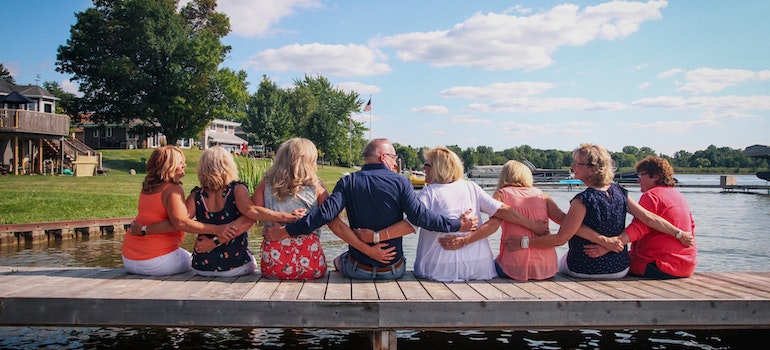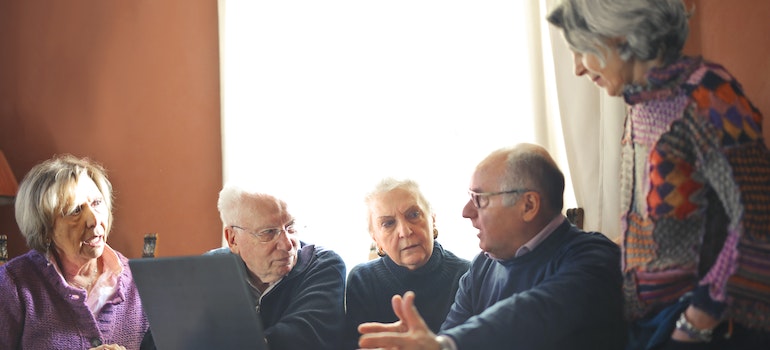Alcoholism, a shadowy affliction, doesn’t pick favorites based on age or status. It threads its way across all age groups, casting its net wide. Yet, when we discuss substance abuse, the senior populace’s struggles frequently fade into the background, leaving a significant segment of our community grappling silently. Alcoholism among seniors in West Virginia isn’t just a cold, clinical term—it narrates stories of perseverance, quiet suffering, and resilience. But more than the addiction itself, the deeply entrenched stigma surrounding it further isolates our elderly, pushing them away from the life-saving help they need.
The Harmony Ridge Recovery Center WV firmly believes that acknowledging this issue is the first step toward genuine change. Through this article, we aim to shed light on the often-underestimated problem of alcoholism among our senior citizens, offering insights and pathways to recovery. Together, we will uncover the layers of misunderstanding and advocate for a society where everyone, regardless of age, can seek help without judgment.
What Does Alcoholism Among Seniors in West Virginia Mean?
In their golden years, seniors can find themselves entangled in its clutches, often stemming from a range of deeply personal and unique reasons. To truly grasp the gravity and nuances of alcoholism among seniors, we must delve into its root causes, the inherent challenges this age group faces, and specific data pointing to the reality in West Virginia.

What Are the Factors Contributing to Alcoholism Among Seniors in West Virginia?
Many factors can lead to alcoholism, especially in one’s later years. For most seniors, retirement, losing a loved one, or declining health can lead to loneliness and depression. Alcohol may initially seem like a way to cope, filling the void or numbing the pain. For some, what starts as a glass of wine in the evening can escalate, becoming a crutch they rely upon. The lack of routine post-retirement and fewer social interactions can sometimes exacerbate these tendencies. With specific facilities like alcohol rehab for seniors, it’s possible to address these unique factors and offer specialized care.
The Unique Challenges Seniors Face in Recognizing and Addressing Alcoholism
Seniors often grapple with challenges that make recognizing and confronting alcoholism more difficult. Age-related changes in metabolism can heighten alcohol’s effects, meaning even moderate drinking can lead to problems. Moreover, signs of alcohol abuse, such as forgetfulness or balance issues, can be mistakenly attributed to the natural aging process or other health conditions, making it harder for the individual and their loved ones to identify the problem. This difficulty is further intensified by the weight of societal expectations, where admitting to a substance issue feels like a taboo, especially for seniors struggling with addiction.
The surge in alcoholism among older people isn’t an isolated issue; it reflects a broader trend across the United States. For seniors looking for rehab in WV, understanding the broader context might help demystify the local situation. Here are some general U.S. statistics that offer insight:
- The National Institute on Alcohol Abuse and Alcoholism reported that in 2020, around 5.5% of adults aged 65 and up admitted to binge drinking in the past month.
- Hospital admissions for alcohol-related issues are on the rise for individuals over 65, increasing by nearly 35% between 2006 and 2014.
- Nearly 80% of seniors in the U.S. were on medication in 2020, and combining those with alcohol can lead to severe health risks, making the elderly more vulnerable to the adverse effects of alcohol.
While these statistics glimpse the national scenario, West Virginia’s specific data can better tailor interventions and resources to address the state’s unique challenges. Early signs indicate a pressing concern, emphasizing the need for increased awareness, understanding, and intervention locally.

The Social and Cultural Stigma of Alcoholism Among Seniors in West Virginia
The battle against alcoholism isn’t merely a personal struggle with the bottle; it often involves confronting societal norms, prejudices, and misconceptions. When we zero in on seniors, the maze of stereotypes and the weight of cultural biases intensify, casting shadows of shame, guilt, and denial.
Societal Stereotypes and Misconceptions
When it comes to elders, societal views can be rather binary. On one end, we perceive them as the wise, experienced generation deserving of respect. Conversely, we sometimes dismiss them, overlooking their struggles and boxing them into narrow roles. This dichotomy becomes evident when addressing alcoholism among older people. Misconceptions abound:
- “Seniors don’t deal with addiction.” It’s a fallacy that has led many to overlook early signs of alcoholism in older adults.
- “It’s just a phase or a coping mechanism for loneliness.” Such beliefs undermine the gravity of the issue, painting it as a transient concern.
- “They’re too old for recovery.” This dangerous misconception can discourage seniors from seeking timely intervention. Fortunately, places like alcohol rehab centers in West Virginia challenge this narrative, offering tailored programs for seniors.
The Impact of Cultural and Generational Factors on Stigma
Culture and generation play pivotal roles in shaping our perceptions of alcoholism among seniors in West Virginia. The older generations, having grown up when mental health and addiction were hushed topics, often find it harder to discuss or accept such issues openly. They might see admitting to a problem as a sign of weakness or fear of societal judgment. It is particularly pronounced in close-knit communities, like those around the alcohol rehab center near Huntington WV, where everyone knows everyone, and the fear of being ‘talked about’ can deter many from seeking help.
Some of the most common misconceptions and stereotypes are:
- Seniors are ‘immune’ to addiction.
- Alcoholism is a ‘young person’s problem.’
- Seeking help is a sign of weakness, especially for the older generation.
- Elderly individuals can’t change or adapt, so rehab is futile.
These deep-rooted stereotypes and cultural pressures add complexity to the already daunting journey of recognition and recovery for seniors grappling with alcoholism.

Health and Mental Health Implications
Alcoholism’s clutches extend far beyond the bottle, affecting physical and mental well-being, particularly in older adults. Seniors grappling with alcoholism find themselves at the crossroads of health complications, further intensified by the societal stigma that casts shadows of doubt, guilt, and isolation. Unraveling these implications’ layers can illuminate the significance of early intervention and specialized care, particularly for our cherished veterans.
With its diminished metabolic rates and potential co-morbidities, the senior body faces heightened risks when alcohol enters the mix. Physically, alcohol can exacerbate conditions like hypertension, diabetes, and cardiac issues. It can also lead to liver damage, digestive problems, and increased susceptibility to falls and injuries. Mentally, alcohol can cloud judgment, intensify feelings of depression, and hasten cognitive decline. The road to recovery, while challenging, isn’t unattainable. Centers like the alcohol rehab in Fairmont WV offer tailored programs to address these multifaceted challenges seniors face.
The Role of Stigma in Preventing Seniors from Seeking Help and Treatment
The stigma, often a suffocating blanket of misconceptions, can act as a deterrent, pushing seniors further into the shadows. This fear of being labeled or misunderstood makes many hesitant to admit their struggles, let alone seek professional help. Places like the alcohol rehab center in Morgantown WV continually work against this tide, trying to foster an environment of understanding, acceptance, and healing.
The Importance of Early Intervention
Time is of the essence. The earlier the intervention, the better the chances of recovery and minimizing health implications. Early recognition and treatment can be life-changing, especially for our veterans, who might be battling trauma alongside addiction. The veterans alcohol rehab facilities specialize in understanding these intertwined battles, offering comprehensive care that addresses addiction and any underlying mental health challenges.

Barriers to Seeking Help
For many seniors grappling with alcoholism, acknowledging the problem is the first step in a labyrinth of challenges. The road to recovery is fraught with internal and external obstacles that can deter even the most determined. Understanding these barriers can offer insight into the holistic approach needed to support our elders effectively.
Here are some common barriers:
- Lack of awareness: Many seniors, especially from rural or less educated backgrounds, might not recognize their drinking habits as problematic.
- Financial concerns: The cost associated with treatment can deter many, especially those on a fixed income.
- Accessibility: Not every senior has the means or the ability to travel to a treatment center, particularly if they live in remote areas.
- Health complications: Existing health issues might make participating in traditional rehab programs challenging.
The palpable fear of societal judgment lies at the heart of many seniors’ reluctance. Being labeled or ostracized, especially in smaller communities around the alcohol rehab center near Point Pleasant WV, can be a paralyzing prospect. This fear of discrimination, of being reduced to just their addiction, can make many seniors wear a mask of ‘normalcy,’ hiding their struggles from the world.
The Role of Healthcare Providers and Family Members in Addressing Alcoholism Among Seniors in West Virginia
The people closest to seniors can be their most significant allies or unintentional barriers. Healthcare providers, with their clinical approach, might sometimes overlook the emotional struggles tied to addiction. Family, driven by concern, might unintentionally shame or isolate the senior. However, places like the alcohol rehab center in Clarksburg WV emphasize family and healthcare providers’ vital role in recognizing the issue and offering unwavering support.
Overcoming Stigma and Promoting Support
Facing the storm of alcoholism is daunting, and even more so when coupled with societal stigma and isolation. However, hope and change are on the horizon. By adopting certain strategies and emphasizing community support, we can pave the way for seniors to confront their addiction and thrive beyond it.
Strategies for Reducing the Stigma of Alcoholism Among Seniors in WV
Combatting the entrenched stigma surrounding alcoholism in seniors requires a multi-pronged approach. Here’s a look at some of the strategies:
- Education and awareness campaigns: By spotlighting the issue, we can normalize the conversation around alcoholism. These campaigns can debunk myths, highlight signs, and provide resources. They can be disseminated through community centers, churches, and healthcare facilities to reach the broadest audience.
- Creating safe and non-judgmental spaces for seniors to discuss their challenges: Establishing support groups or counseling sessions where seniors can freely express their fears, concerns, and experiences can go a long way. Grounded in empathy and understanding, these spaces can act as sanctuaries for seniors to share, learn, and grow.

The Importance of Family and Community Support
Families and communities form the backbone of any individual’s support system. Their role becomes even more paramount when a senior navigates the rough seas of alcoholism. A family’s understanding, patience, and proactive approach can help bridge the gap between recognizing the problem and seeking help. On a broader scale, community initiatives, from local gatherings to workshops, can create an environment where seniors feel seen, heard, and valued.
A Collective Responsibility of Combating Alcoholism Among Seniors in West Virginia
In addressing alcoholism among seniors in West Virginia, we must recognize that each number represents a life with its own story of resilience, struggle, and hope. As a community, our role isn’t just to acknowledge the problem and actively participate in its solution. Through understanding, compassion, and dedicated action, we can ensure our seniors aren’t left alone to face their battles. Together, we can foster an environment where they feel valued, supported, and empowered to reclaim their lives.



